News analysis
Supply chains are a major worry worldwide

Supply chains are an increasingly complex and globalised area of corporate leadership, and companies have multiple concerns about how they’ll manage them.
The 2024 Global Trade Report from the Thomson Reuters Institute has revealed that almost three in every four companies (74%) have been impacted by supply chain due diligence requirements in the recent past.
The report calls it “by far the most impactful systemic change on global trade”. It comes amid a multitude of worries about the logistics of managing a modern supply chain, with issues like disruption, new regulations, staffing issues and competition topping the list.
The report called the 74% figure “understandable” given these multiple challenges. It also singles out geopolitics as a major driver of supply chain worries – which makes sense, given the increasingly tense and nationalistic tones emanating from some of the world’s biggest economies.
“It’s also not surprising that several other systematic changes with broad impact involve geopolitical issues,” the report said.
“Geopolitically charged export control laws impact more than half of respondents’ companies, the survey noted. Close behind, 41% of respondents said their companies were affected by retaliatory tariffs.”
Why is this a big deal?
Supply chain concerns are nothing new, but they have taken on extra importance in the 2020s because they constantly seem under threat. If the pandemic isn’t causing problems, it’s one of several major international stand-offs and disputes that are undoubtedly becoming a defining feature of this decade.
Think of the war in Ukraine, the crises in Gaza, Lebanon and Syria, the rise of right-wing protectionist policies, and the evolving animosity between the US and China. These examples underline just how fragile national aspirations can affect international supply chains.
We are where we are.
What is supply chain due diligence?
The report says 74% have had to deal with systems changes to their supply chain due diligence, but what exactly does that mean?
It means monitoring and evaluating supply chains to ensure they comply with legal, ethical, and environmental standards. These days, expectations around supply chains are so high that you must carefully scrutinise suppliers and partners for the same risk you look for within your business.
Due diligence processes often include gathering data on supplier practices, conducting risk assessments, and implementing measures to address identified issues. Beyond compliance, supply chain due diligence helps companies protect their reputations, meet consumer expectations, and align with broader ESG goals.
Are these standards likely to get tougher?
They are unlikely to get easier.
Getting tougher is a harder call to make, given the increased debate around reporting, ESG and other factors that currently govern how we see supply chain due diligence. It is possible that more laws and expectations can come in the near future; it’s also possible that the current rules and expectations will stick around while companies get used to them and differing political factions agree on their future.
However, the heightened focus on reporting and transparency won’t go away, and in a world where international trade is looking increasingly polarised, that focus creates new challenges for businesses.
What are the report’s other main findings, and why do they matter for corporate governance?
The report identified other key trends in global trade:
- 81% of respondents cited ESG as a major factor in supplier selection, which is very high and starkly contrasting the prevailing narrative about how ESG has become fractured, unfit for purpose, and mired in endless left-right debate. It shows corporate leaders that while the loud voices can often criticise, the flow of business underneath still respects the principles of ESG.
- Trade disputes, export controls, and regional conflicts create far-reaching supply chain disruptions. This should serve as a wake-up call to boards and executives if it hasn’t already: the world is in a time of conflict mode that it hasn’t seen since the 1980s and before, except this time, business is much more globalised, so effects will be marginally greater. This means leadership must concentrate on risk analysis, strategic pivoting and supply chain diversification.
- Companies are investing heavily in supply chain visibility, security, and data analytics. This is a good sign, especially on the analytics front. Nowadays, business operations produce vast amounts of data, and exploring the potential of new technology to process it will be a significant asset in future.
The methodology
The 2024 Global Trade Report, conducted by Thomson Reuters, is based on a survey of 225 global trade professionals from diverse sectors, including manufacturing, retail, and technology. Participants represented companies of varying sizes and geographic regions, such as North America, Europe, and Asia-Pacific, with at least 10% of their revenue derived from international trade.
Insights on leadership
Want more insights like this? Sign up for our newsletter and receive weekly insights into the vibrant worlds of corporate governance and business leadership. Stay relevant. Keep informed.

